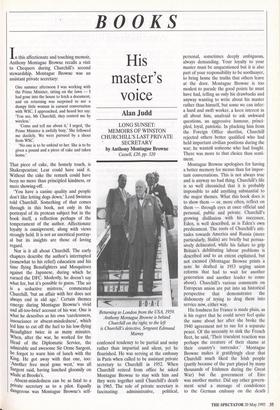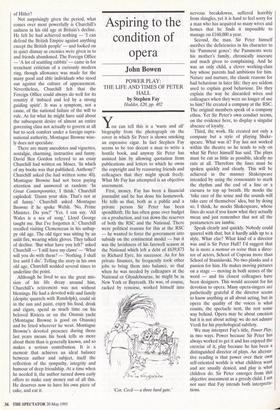BOOKS
His master's voice
Alan Judd
LONG SUNSET: MEMOIRS OF WINSTON CHURCHILL'S LAST PRIVATE
• SECRETARY by Anthony Montague Browne Cassell, £20, pp. 320 In this affectionate and touching memoir, Anthony Montague Browne recalls a visit to Chequers during Churchill's second stewardship. Montague Browne was an assistant private secretary:
One summer afternoon I was working with the Prime Minister, sitting on the lawn — I had gone into the house to fetch a document, and on returning was surprised to see a dumpy little woman in earnest conversation with WSC. I approached, and heard her say: `You see, Mr Churchill, they control me by wireless.'
`Come and tell me about it,' I urged, 'the Prime Minister is awfully busy.' She followed me docilely. We were pursued by a shout from WSC.
'No one is to be unkind to her. She is to be given a pound and a piece of cake and taken home.'
That piece of cake, the homely touch, is Shakespearian; Lear could have said it. Without the cake the remark could have been no more than principled kindness, or mere showing-off.
`You have a canine quality and people don't like letting dogs down,' Lord Swinton told Churchill. Something of that comes through in this book, not only in the portrayal of its protean subject but in the book itself, a reflection perhaps of the temperament of the author. Affectionate loyalty is omnipresent, along with views strongly held. It is not an uncritical portray- al but its insights are those of loving regard.
Nor is it all about Churchill. The early chapters describe the author's interrupted (somewhat to his relief) education and his time flying Beaufighters and Mosquitoes against the Japanese, during which he. earned the DFC. Modestly, he doesn't say what for, but it's possible to guess. 'The air is a seductive mistress,' commented Churchill, tut an affair with her does not always end in old age.' Certain themes emerge during Montague Browne's vivid and all-too-brief account of his war. One is what he describes as his own 'carelessness, insouciance or absent-mindedness', which led him to cut off the fuel to his low-flying Beaufighter twice in as many minutes. When, after the war, he worked for the Head of the Diplomatic Service, the admirable and awesome Sir Orme Sargent, he forgot to warn him of lunch with the King. He got away with that one, too: `Another free meal gone west,' was all Sargent said, having lunched gloomily on whale at Brooks's.
Absent-mindedness can be as fatal to a Private secretary as to a pilot. Equally dangerous was Montague Browne's self- Returning to London from the USA, 1959. Anthony Montague Browne is behind Churchill on the right; to the left is Churchill's detective, Sergeant Edmund Murray confessed tendency to be partial and noisy rather than impartial and silent, yet he flourished. He was serving at the embassy in Paris when called to be assistant private secretary to Churchill in 1952. When Churchill retired from office he asked Montague Browne to stay with him and they were together until Churchill's death in 1965. The role of private secretary is fascinating: administrative, political, personal, sometimes deeply ambiguous, always demanding. Your loyalty to your master must be unquestioned but it is also part of your responsibility to be soothsayer, to bring home the truths that others leave at the door. Montague Browne is too modest to parade the good points he must have had, telling us only his drawbacks and anyway wanting to write about his master rather than himself, but some we can infer: a hard and swift worker, a keen interest in all about him, unafraid to ask awkward questions, an aggressive humour, princi- pled, loyal, patriotic. In plucking him from the Foreign Office shortlist, Churchill rejected others better qualified who had held important civilian positions during the war; he wanted- someone who had fought. There was more to that choice than senti- ment.
Montague Browne apologises for having a better memory for menus than for impor- tant conversations. This is not always true and is anyway no bad thing. Churchill's life is so well chronicled that it is probably impossible to add anything substantial to the major themes. What this book does is to show them — or, more often, reflect on them — through eyes at once official and personal, public and private. Churchill's growing disillusion with his successor, Eden, is well described, as is Eden's own predicament. The roots of Churchill's atti- tudes towards America and Russia (more particularly, Stalin) are briefly but persua- sively delineated, while his failure to grip Britain's debilitating labour problems is described and to an extent explained, but not excused (Montague Browne prints a note he drafted in 1953 urging union reforms that had to wait for another generation and another leader to come about). Churchill's various comments on European union are put into an historical perspective that demonstrates the dishonesty of trying to drag them into service now, either way.
His fondness for France is made plain, as is his regret that he could never feel quite the same about her after she broke the 1940 agreement not to sue for a separate peace. Of the necessity to sink the French fleet, he said, 'Their truculent reaction was perhaps the creature of their shame at their country's surrender.' Montague Browne makes it gratifyingly clear that Churchill much liked the Irish people (partly because of the part played by many thousands of Irishmen during the Great War) but the government of Eire was another matter. Did any other govern- ment send a message of condolence to the German embassy on the death of Hitler?
Not surprisingly given the period, what comes over most powerfully is Churchill's sadness in his old age at Britain's decline. He felt he had achieved nothing — 'I can defend the British Empire against anything except the British people' — and looked on in quiet dismay as enemies were given in to and friends abandoned. The Foreign Office — 'A lot of scuttling rabbits' — came in for trenchant criticism of a curiously modern ring, though allowance was made for the many good and able individuals who stood out against the culture of appeasement. Nevertheless, Churchill felt that the Foreign Office could always do well for its country if 'imbued and led by a strong guiding spirit'. It was a symptom, not a cause, of the national failure of the will to rule. As for what he might have said about the subsequent desire of almost an entire governing class not actually to govern at all but to seek comfort under a foreign supra- national authority, Montague Browne wise- ly does not speculate.
There are many anecdotes and vignettes, nostalgic, charming, instructive and funny. David Ben Gordon referred to an essay Churchill had written on Moses. 'In which of my books was that published, Anthony?' Churchill asked (he had written some 40). Montague Browne had not been paying attention and answered at random: 'In Great Contemporaries, I think.' Churchill exploded: 'Damn your skin. That's not at all funny.' Churchill asked Montague Browne if he spoke Welsh. 'No, Prime Minister. Do you?"Yes. I can say, 'All Wales is a sea of song.' Lloyd George taught me. But I've forgotten it.' Churchill recalled visiting Clemenceau in his unhap- py old age. The old tiger was sitting by an unlit fire, wearing white gloves. They talked of decline. 'But what have you left?' asked Churchill — 'I still have my claws' — 'What will you do with them? — 'Nothing. I shall live until I die'. Telling the story in his own old age, Churchill nodded several times to underline the point.
Although he lived to see the great mis- sion of his life decay around him, Churchill's retirement was not without blessings. He had a devoted wife and family (despite quarrels with Randolph), could sit in the sun and paint, enjoy his food, drink and cigars, spend as much time on his beloved Riviera or on the Onassis yacht (Montague Browne is good on Onassis) and be feted wherever he went. Montague Browne's devoted presence during those last years means his book tells us more about them than is generally known, and so makes a serious contribution. It is a memoir that achieves an ideal balance between author and subject, itself the reflection of the sympathy, integrity and humour of deep friendship. At a time when he needed it, the author turned down early offers to make easy money out of all this. He deserves now to have his own piece of cake, and eat it.



































































 Previous page
Previous page